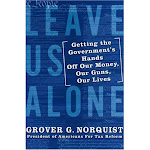
While perusing the Independent Gay Forum, I found a reference to this Washington Post article. What specifically caught my eye was that one of the plaintiffs is Tom G. Palmer, whose blog I have listed in thing of interest to me right now. I have met Tom Palmer several times at policy-type conferences and found him to be one of the most articulate and intelligent men I have ever had the pleasure to listen to. The Washington Post article makes me admire him even more.
The article discusses the motivation behind the plaintiffs in a case to overturn DC's complete ban on guns (an article on the court ruling itself can be found here). The article on motivation states in pertinent part:
This got me to thinking. As Nick's mom pointed out (here), although homosexuality is more accepted today than ever before, homophobia has not been eradicated. Certainly, Tom Palmer's experience occurred 25 years ago, and it has been almost 10 years since Matthew Shepard's brutal murder; however, there are some areas in which being an openly gay man can be dangerous. Nick's mom didn't mention the Bible belt simply as a jab at the Theocrats. Both Nick and I are from the South, where being a proud member of a minority, especially a sexual minority, is at best a risky endeavor. It would seem that the collective experience of gays might make us wary to voluntarily give up, indeed support candidates who would require us to give up, the personal protection of a handgun. In fact, any member of a vulnerable minority living in a potentially hostile environment should be among the most fervent defenders of the right to carry handguns.[Tom] Palmer, 50, said that his gun rescued him 25 years ago when he was approached by a group of men in San Jose. Palmer, who is gay, said he believed the men were targeting him because of his sexual orientation. He said he and a friend started to run away, but then he took action.
"I turned around and showed them the business side of my gun and told them if they took another step, I'd shoot," he said, adding that that ended the confrontation.
Palmer moved to the District in 1975 and lives in the U Street NW corridor, where police have struggled lately to curb assaults and other crimes. He said he considers it a fairly safe neighborhood, although his home was broken into once. He works as director of educational programs for the Cato Institute and travels to war-torn countries including Iraq.He keeps a shotgun and several pistols stored in Colorado and Virginia. Guns have been used in his family for generations. "My mother always had two, and she kept one under her bed," Palmer said.

Apart even from the danger of violent homophobia, which I am confident will wane over time even in the Bible belt, I'd want to carry a gun. Assaults generally, not just those motivated by intolerance, are a danger and unpredictable. I could be a target for looking like my wallet has cash in it, for being in a store during a hold-up, or simply for being the first person a meth addict sees one day. If these dangers are enough to make me want to carry a handgun, the danger of violent homophobia would increase my need for protection, even if only marginally.
Of course less informed gun control advocates will argue if no one had guns, assaults wouldn't be a problem. My answer is assaults do not have to be with guns. Someone could threaten me with a baseball bat, a knife, or even a group of unarmed but physically imposing individuals. A gun is going to win those confrontation every time. When confronted with another gun, producing a weapon of my own creates a sort of mutually assured destruction that most of the time will make my would-be assailant prefer to back down and find an unarmed target. I know it's trite, but I earnestly believe that if guns are outlawed, outlaws will still have guns. ("gosh, I'd like to commit an armed robbery to support my crack habit, but dammit, I'm not allowed to carry a gun").
The slightly more informed gun control advocates will then point out that countries such as the UK and Japan have strict gun control laws and almost no violent crime. As for the UK, I would point to this (albeit dated) BBC article noting that in the two years following the ban on handgun, gun crimes rose by almost 40% (!). The article notes that smuggling guns into the UK is a problem, one we deal with in this country in regard to illegal narcotics. To be fair, the report did have an axe to grind: it was commissioned by the Countryside Alliance's Campaign for Shooting. However, such studies cannot be discounted simply because they favor the positions of those who commission them. The numbers are apparently there, or else the Campaign wouldn't have released the study. And releasing a fraudulent study would be more damaging to their goals than releasing one that contradicted their positions.
Similarly, although Japan's gun control has been more successful, it has been at the cost of civil liberties that I think few in this country would find palatable, let alone appropriate. This article (also dated--it's hard to find current public domain studies to link to) notes in Part III that in order to enforce the gun possession laws, the Japanese Police are given broad search and seizure powers. According to the article:
In practice, the special law for weapons searches is not necessary, since the police routinely search at will. They ask suspicious characters to show them what is in their purse or sack. In the rare cases where a policeman's search (for a gun or any other contraband) is ruled illegal, it hardly matters; the Japanese courts permit the use of illegally seized evidence. [citations omitted].Implementing a similar policy in the US would immediately raise very strong Fourth Amendment objections (let alone the Second Amendment).
 Then, of course, there are the "concerned citizens" who note that an absence of gun would reduce accidental gun injuries and death. I agree that the concerned citizens have a valid argument, though I do not agree with their solution. I grew up in a house with guns, and my folks instilled in me from a very early age the seriousness of the tool. When I got old enough, my parents enrolled me into a gun safety class; one that stressed not only the necessity of having personal protection, but also the extreme danger of being careless with your gun. I think education rather than elimination is the better solution to accidental gun injury.
Then, of course, there are the "concerned citizens" who note that an absence of gun would reduce accidental gun injuries and death. I agree that the concerned citizens have a valid argument, though I do not agree with their solution. I grew up in a house with guns, and my folks instilled in me from a very early age the seriousness of the tool. When I got old enough, my parents enrolled me into a gun safety class; one that stressed not only the necessity of having personal protection, but also the extreme danger of being careless with your gun. I think education rather than elimination is the better solution to accidental gun injury.Do I practice what I preach? Sadly not. I do not carry or even own my own handgun. I spend most of my day in a school building, and it is therefore illegal for me to carry a gun. Leaving a gun in the car is an almost foolproof way to have your gun stolen, and leaving it at home offers as much protection as not having one at all. Finally, guns aren't cheap and I have not been able to afford one of my own yet. On the other hand, I do go to the shooting range on a semi-regular basis, and fully intend to buy a gun once I can afford it and it become a more useful tool than it is while I am in school. Remember, Tom Palmer was only 25 when his gun saved his life. I only hope that I can wait at least another year before I need my own.



2 comments:
Great post! :)
Regarding some European countries' boastful claims that their crime rates are lower "because of" gun control, well, their crime rates are artificially depressed. There is major (MAJOR)systematic underreporting (or outright non-reporting) of crimes in Great Britain and many European countries. Theodore Dalrymple has written some on it--start with him if you'd like to learn more. Citizens in these countries are utterly defenseless. On a positive note, I seriously doubt that Americans would accept such a State stripping of their self-defense rights: the last time Americans were forced into that kind of vulnerability (under Jimmuh Carter), all the Death Wish movies started coming out and Reagan got elected. :)
I need to let you borrow my John Lott books. The Bias Against Guns provides lots of stats and studies and really pulls all the info together well. It's from 2003, so the info is a couple years old, but not really out of date.
Marcia
Post a Comment